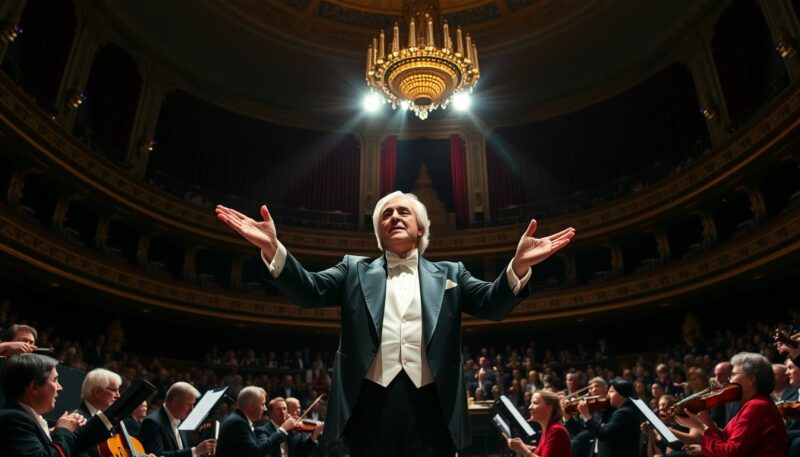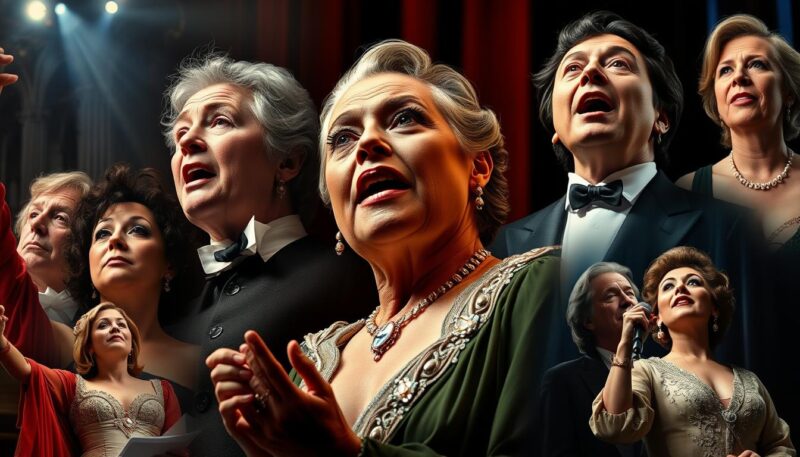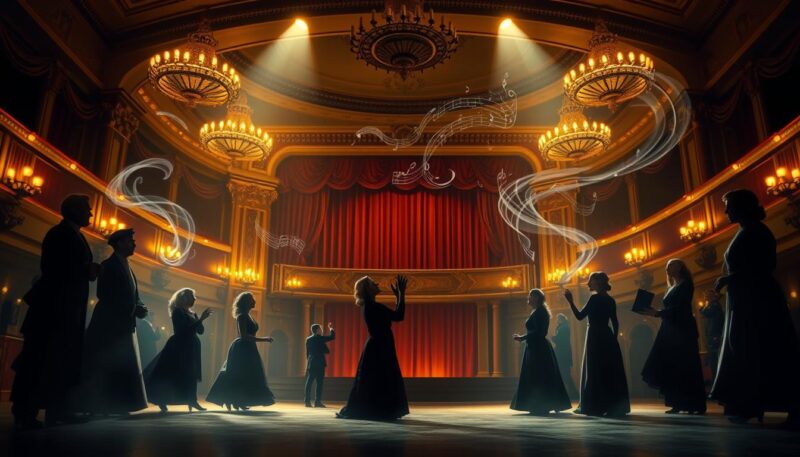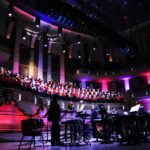Opera, a centuries-old form of musical expression, has given rise to some of the most iconic voices and performers in history. From the passionate sopranos to the resonant tenors, these remarkable artists have captivated audiences, transporting them to emotional heights with their vocal prowess and dramatic flair. The magnificent opera houses worldwide have reverberated with performances by legends that continue to inspire and thrill listeners. This comprehensive exploration will delve into the lives and legacies of some of the most famous opera singers, celebrating their contributions to this emotionally-charged art form and examining the impact they’ve had on culture both within and beyond the hallowed halls of the world’s opera houses.
Key Takeaways
- Luciano Pavarotti’s career spanned several decades, performing in some of the world’s most prestigious opera houses and concert stages.
- Maria Callas’s renditions of characters like Tosca and Norma elevated her to legendary status in opera.
- Renée Fleming excels in both contemporary and classical operas, earning widespread acclaim.
- Plácido Domingo portrayed iconic roles like Don José and Otello, resonating with audiences worldwide.
- Joan Sutherland’s mastery of the bel canto repertoire established her as one of the foremost sopranos of her era.
The Legendary Luciano Pavarotti
Luciano Pavarotti, an icon among the best classical opera singers, rose to fame through his captivating voice and charismatic presence. Revered as one of the famous tenors, Pavarotti managed to capture the hearts of audiences worldwide, introducing them to the enchanting world of opera.
Early Life and Career
Born on October 12, 1935, in Modena, Italy, Pavarotti’s passion for opera was ignited early on. His noteworthy journey began with the Corale Rossini in 1955, where his choir won first prize at the International Eisteddfod in Llangollen, Wales. This initial triumph laid the foundation for his illustrious career. By 1961, Pavarotti had made his debut as Rodolfo in La bohème at the Teatro Municipale in Reggio Emilia, marking the beginning of his meteoric rise in the opera world. His first international performance in La traviata in Belgrade, Yugoslavia, and subsequent debut at the Vienna State Opera on February 23, 1963, showcased his undeniable talent.
Signature Roles and Performances
Pavarotti’s career was defined by several signature roles that highlighted his remarkable vocal range and dramatic prowess. Notably, his role as Tonio in Donizetti’s La fille du régiment earned him the title of ‘King of the High Cs.’ He made a historic debut at La Scala on April 28, 1965, performing in the revival of La bohème under the baton of Herbert von Karajan. One of his most famous performances was at the New York Metropolitan Opera, where he earned a record 17 curtain calls after delivering nine high Cs with apparent ease. This performance affirmed his status as one of the best classical opera singers of his time.
Global Impact and Legacy
Pavarotti’s influence extended far beyond the opera stage. His 1977 appearance on Live from the Met attracted one of the largest opera audiences on television, making opera accessible to a broader public. Pavarotti’s efforts in popularizing opera included memorable performances during the FIFA World Cup and his involvement in The Three Tenors, which became the best-selling classical album of all time. Furthermore, his contributions were recognized through numerous accolades, including the Grammy Legend Award in 1998 and a star on the Hollywood Walk of Fame in 2022. Pavarotti’s remarkable career, spanning from 1955 to 2006, was a testimony to his unparalleled talent, with over 100 million records sold. His enduring legacy continues to inspire future generations, securing his place among the most famous tenors and best classical opera singers in history.
Maria Callas: The Prima Donna
When discussing famous sopranos, the name Maria Callas stands out as an enduring icon. Born on December 2, 1923, in New York City, Maria Callas, often referred to as “La Divina,” reshaped the landscape of opera with her extraordinary talent and dramatic intensity. Her journey in the world of opera was marked by unparalleled dedication and a repertoire that included the works of Donizetti, Bellini, Rossini, Verdi, Puccini, and Wagner.
Callas received her musical education at the Athens Conservatoire in Greece, where she showcased exceptional talent and a relentless work ethic. It wasn’t long before she surpassed her peers, setting the stage for her future as one of the best opera singers of the 21st century. Her vocal prowess and bel canto technique earned her critical acclaim and the admiration of audiences worldwide.
One of the defining moments of Maria Callas’s career was her weight loss of around 80 pounds in less than a year, which significantly enhanced her dramatic expressiveness on stage. This commitment to her artistry, combined with her wide-ranging voice, made her an epitome of a prima donna assoluta in opera history.
Callas’s most memorable performances were in roles such as Tosca and Norma, where she brought an emotional depth and intensity that captivated audiences. Despite facing controversies and public scrutiny, Callas’s influence in the opera world remains undeniable. Even 39 years after her passing on September 16, 1977, her recordings continue to be top sellers and an inspiration for the best opera singers of the 21st century.
Leonard Bernstein famously referred to Maria Callas as “the Bible of opera,” a testament to her lasting impact and the high regard in which she is held. Her legacy is further cemented by her numerous accolades, including the Grammy Lifetime Achievement Award. Maria Callas’s life and career continue to inspire countless biographies, adding to the wealth of literature that celebrates her remarkable contributions to the world of opera.
Plácido Domingo: The Versatile Maestro
Plácido Domingo is one of the most influential opera singers of our time. Born in Madrid, Spain, on January 21, 1941, Domingo’s career spans from 1957 to the present, marking him as a true historical legend in opera. His contributions to the world of music are unparalleled, making him a versatile maestro whose talents extend beyond his rich tenor voice.

A Pioneering Career
Domingo’s pioneering career began at a remarkable pace. At the age of sixteen, he made his first professional appearance accompanying his mother on the piano at a concert in Mérida, Yucatán. His operatic debut in a leading role came in 1961, as Alfredo in *La traviata* at the Teatro de la Ciudad in Monterrey. By 1968, he had made his official debut at the Metropolitan Opera in New York, stepping in for Franco Corelli in Cilea’s *Adriana Lecouvreur*. Domingo’s versatility was further highlighted when he performed in the landmark performance of *Tosca* in Central Park in 1986, attracting a massive audience.
Signature Roles and Achievements
Plácido Domingo has performed more opera roles than any other singer in history, boasting an impressive 151 different roles by the year 2020. His portrayals of Don José in *Carmen* and Otello in Verdi’s critical works are benchmarks, showcasing his emotional depth and storytelling prowess. His vocal style, often described as thick and smooth, distinctly sets him apart from other famous tenors like Luciano Pavarotti. Moreover, his first pop album, “Perhaps Love,” released in 1981, sold almost four million copies, demonstrating his ability to transcend musical boundaries. The first Three Tenors recording, which included Domingo, became the best-selling classical album of all time, further cementing his status among historical legends in opera.
Contributions Beyond Singing
Beyond his singing career, Plácido Domingo has left an indelible mark as a conductor and an opera director. His directorial roles have made significant strides in making opera more accessible and appreciated as a timeless and evolving art form. Additionally, Domingo is recognized for his versatility in performing Latin American songs, Mexican rancheras, and Zarzuela alongside traditional opera. His commitment to the arts saw him performing continuously between 2019 and 2021 in major cities like Berlin, Budapest, Milan, Moscow, and Vienna. Plácido Domingo’s multifaceted career not only enriches the world of classical music but also bridges cultural divides through his wide-ranging talents.
Famous Opera Singers: From the Past to Present
Opera’s heritage is enriched by historical legends and modern-day icons, each bringing their unique talents and contributions. From enduring classics to contemporary interpretations, opera singers continue to captivate audiences around the world.
Historical Legends
Historical legends like Enrico Caruso, Dame Nellie Melba, and Maria Callas have laid the foundation for what opera is today. Enrico Caruso, born in Naples in 1873, was the most famous name in the world of entertainment in the early years of the 20th century. Caruso was the first singer to sell a million discs, with his record “Vesti la giubba” being the milestone piece.

Maria Callas, born in 1923, rose to fame at the end of the 1940s and was renowned as the supreme singing-actress of her times. Known as “La Divina” in Italy, Callas was famed for her captivating performances that caused stampedes at the box office. Similarly, Joan Sutherland, who established herself as a star in Donizetti’s “Lucia di Lammermoor” at Covent Garden in 1959, is regarded as the greatest Australian singer since Nellie Melba.
Modern-Day Icons
Modern-day icons continue to innovate and breathe new life into classic roles. Andrea Bocelli, one of the world’s most famous Italian opera singers, is celebrated for his powerful and emotive voice. Sir Bryn Terfel, who famously held the title role in ENO’s “The Marriage of Figaro” in 1991, has also made significant contributions to the art.
This vibrant lineage of talent includes not only tenors but also other voice types such as baritones and mezzo-sopranos. Famous modern opera singers like Renée Fleming and Cecilia Bartoli bring contemporary flair to the stage, demonstrating the adaptability and endurance of opera through the centuries. These influential opera singers continue to captivate audiences, ensuring that the rich tradition of opera remains relevant and accessible to new generations via initiatives like the Under 35’s Discounted Opera Tickets program, which even offers free entry for those under 21.
| Opera Singer | Timeline | Legacy |
|---|---|---|
| Enrico Caruso | Early 20th Century | First singer to sell a million records |
| Maria Callas | 1950s | Known as “La Divina”, set box office records |
| Dame Nellie Melba | Early 20th Century | Internationally acclaimed soprano |
| Andrea Bocelli | Modern Day | One of the world’s most famous Italian opera singers |
| Sir Bryn Terfel | Modern Day | Renowned for diverse roles and contributions |
Renée Fleming: The People’s Diva
Renée Fleming, known as “The People’s Diva,” stands out among the famous opera singers for her sumptuous soprano voice and ability to traverse genres. Fleming’s vocal mastery encompasses a wide range of languages, including Italian, German, French, Czech, Russian, and English. With her versatile talent, Fleming has performed not just traditional operatic roles but has also ventured into contemporary works, earning her a place among the best opera singers of the 21st century.
In the history of opera, few can match Fleming’s accolades and achievements. She has been nominated for an astounding 18 Grammy Awards, winning five times—a testament to her exceptional artistry. One of Fleming’s groundbreaking moments came in 2008 when she became the first woman to solo headline the Metropolitan Opera’s season-opening night gala in its 125-year history. This milestone highlights her unique position in the world of opera.
Throughout her career, Fleming has collaborated with a diverse array of artists, from Luciano Pavarotti to Lou Reed, showcasing her ability to cross musical boundaries. Her partnerships with Wynton Marsalis, Paul Simon, Andrea Bocelli, Sting, and John Prine further underline her versatility. Besides her vocal performances, Fleming has extended her influence in the opera world by serving as the first-ever creative consultant at the Lyric Opera of Chicago since 2010.
The table below illustrates some of the key highlights of Renée Fleming’s illustrious career:
| Award/Recognition | Year | Significance |
|---|---|---|
| Richard Tucker Award | 1990 | Recognizes outstanding opera singers |
| Carnegie Hall Debut | 1990 | Performed music by Ravel with the New York City Opera Orchestra |
| Grammy Awards | 2000, 2002, 2010, 2013 | Four wins for classical vocal performance and recordings |
| Metropolitan Opera Season-Opening Gala | 2008 | First woman to solo headline in 125-year history |
| Creative Consultant, Lyric Opera of Chicago | 2010 | First-ever creative consultant |
| Echo Awards – Singer of the Year | 2012 | Prestigious German award |
| Music and Mind LIVE | 2020 | Online series on music and health, reaching 650,000 views |
Renée Fleming’s career is marked by her dedication to expanding the reach of opera. She continues to captivate audiences worldwide, confirming her status as one of the famous opera singers and securing her place among the best opera singers of the 21st century.
Joan Sutherland: The Bel Canto Queen
Joan Sutherland, lovingly known as “La Stupenda,” is revered among famous opera singers for her exceptional bel canto technique and stunning coloratura soprano voice. Starting her professional opera career at just 16, Sutherland quickly demonstrated formidable mastery over a repertoire demanding vocal agility and precision. Her iconic performances in roles like Lucia in “Lucia di Lammermoor” solidified her position as one of the best opera singers of the 21st century.
During auditions, Joan Sutherland chose to sing Handel, Mozart, and bel canto pieces instead of dramatic soprano arias. This decision highlighted her commitment to the bel canto style, characterized by evenness throughout her vocal range and great agility. Joan’s technical prowess and the emotive power of her performances have left an indelible mark on opera history, making her one of the best opera singers of the 21st century.
Sutherland’s artistic career was marked by patience and gradual progress, a philosophy she consistently promoted. She emphasized the need for opera singers to work carefully without forcing their voices. Joan herself lived a disciplined life, maintaining good vocal and physical shape, much like a nun. She avoided talking much and focused on rest and quiet before performances, ensuring her voice remained in pristine condition.
Throughout her impressive career, Sutherland achieved numerous milestones. She performed 223 times at the Metropolitan Opera and was honored with a Grammy Award in 1961 for Best Classical Performance – Vocal Soloist. Her debut at the Metropolitan Opera in New York with “Lucia di Lammermoor” received a dazzling 12-minute ovation, reflecting the immense impact of her talent. Joan Sutherland’s voice ranged from a low G to effortless flights above high C, though she faced criticism for her indistinct diction, which she worked to improve during the 1970s.
“Joan Sutherland’s contribution to the bel canto repertoire is unparalleled, and her performances continue to inspire future generations of opera singers to pursue the zenith of vocal artistry.”
Sutherland’s legacy extends beyond her vocal achievements. She collaborated extensively with her husband Richard Bonynge, an Australian conductor and pianist, who understood the nuances of her voice and the bel canto style. Together, they performed and recorded numerous works, significantly enriching the operatic repertoire. Joan’s collaboration with Luciano Pavarotti in the bel canto repertoire exemplifies her dedication to this art form.
Even after her retirement to Les Avants, Switzerland, Joan Sutherland’s influence on the world of opera remains profound. Her disciplined approach to singing, emphasis on patience, and joy in performance have inspired countless young singers. Joan Sutherland, truly one of the best opera singers of the 21st century, left an everlasting legacy with her indomitable spirit and extraordinary talent.
| Milestones | Details |
|---|---|
| Birth | November 7, 1926, Sydney, Australia |
| Grammy Award | 1961 for Best Classical Performance – Vocal Soloist |
| Met Opera Performances | 223 times |
| Nickname | “La Stupenda” |
| Last Full-Length Performance | 1990, Sydney Opera House |
| Death | October 10, 2010, Les Avants, Switzerland |
Conclusion
The pantheon of iconic opera voices is replete with legends who have etched their names into the annals of history. From Enrico Caruso, whose early embrace of recording technology brought opera to broader audiences, to Maria Callas, whose dramatic interpretations set unprecedented standards, each figure mentioned has significantly contributed to the art form. Luciano Pavarotti’s career ran for over four decades, with his rendition of “Nessun Dorma” capturing the hearts of millions worldwide, while Joan Sutherland’s technical brilliance in roles like the Queen of the Night left an indelible mark on the bel canto repertoire.
These opera legends in history have not only entertained but have also expanded the influence of opera beyond traditional boundaries. Their performances have popularized certain roles, brought attention to lesser-known works, and demonstrated that opera is a continually evolving art form. Their enduring legacies continue to shape the aspirations and techniques of the best opera singers of the 21st century, ensuring the art’s vitality and relevance.
As you reflect on the contributions of these renowned figures, remember that support for the opera industry is crucial. Attending live performances, purchasing recordings, and advocating for opera education are just a few ways to sustain this timeless form of cultural expression. The impact of these opera legends is unparalleled, and their influence will undoubtedly inspire future generations to reach new heights in vocal artistry and dramatic interpretation.
Source Links
- https://www.londonsinginginstitute.co.uk/top-10-opera-singers-you-should-know/
- https://singersroom.com/w60/best-opera-singers-of-all-time/
- https://www.classicfm.com/artists/luciano-pavarotti/italian-tenor-family-wife-voice-facts/
- https://www.classicfm.com/discover-music/periods-genres/opera/best-opera-singers-all-time/
- https://en.wikipedia.org/wiki/Luciano_Pavarotti
- https://en.wikipedia.org/wiki/Maria_Callas
- https://operasighs.wordpress.com/2016/09/17/why-was-maria-callas-prima-donna-and-whats-prima-donna/
- https://medhum.med.nyu.edu/view/19013
- https://www.talkclassical.com/threads/placido-domingo-one-of-the-greatest-tenors-of-all-time.76829/
- https://en.wikipedia.org/wiki/Plácido_Domingo
- https://www.pbs.org/wnet/americanmasters/archive/interview/placido-domingo/
- https://www.eno.org/discover-opera/explore-more/opera-singers-to-add-to-your-study-playlist/
- https://www.lookandlearn.com/blog/25666/great-opera-singers-of-the-present-and-the-past/
- https://en.wikipedia.org/wiki/Renée_Fleming
- https://www.deccaclassics.com/en/artists/reneefleming/biography
- https://www.csmusic.net/content/articles/the-joy-of-singing/
- https://en.wikipedia.org/wiki/Joan_Sutherland
- http://classicalmusicguide.com/viewtopic.php?t=36967
- https://kentamplinvocalacademy.com/singer-types/opera/famous-opera/
- https://waleednaeem.com/famous-opera-singers-and-their-contributions/
- https://www.watchmojo.com/articles/top-10-opera-singers







